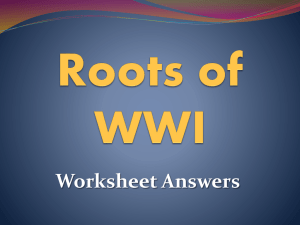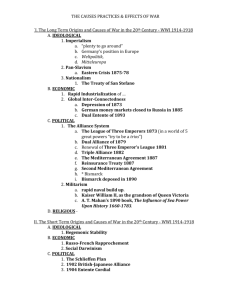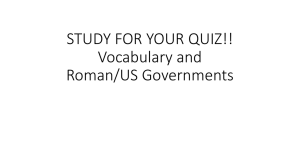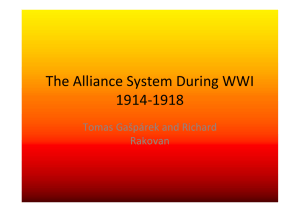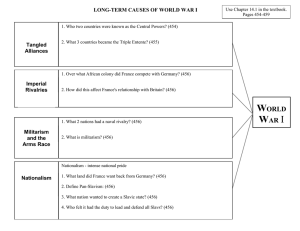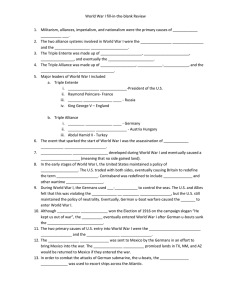World War 1 Review Vocab a. Alliance
advertisement
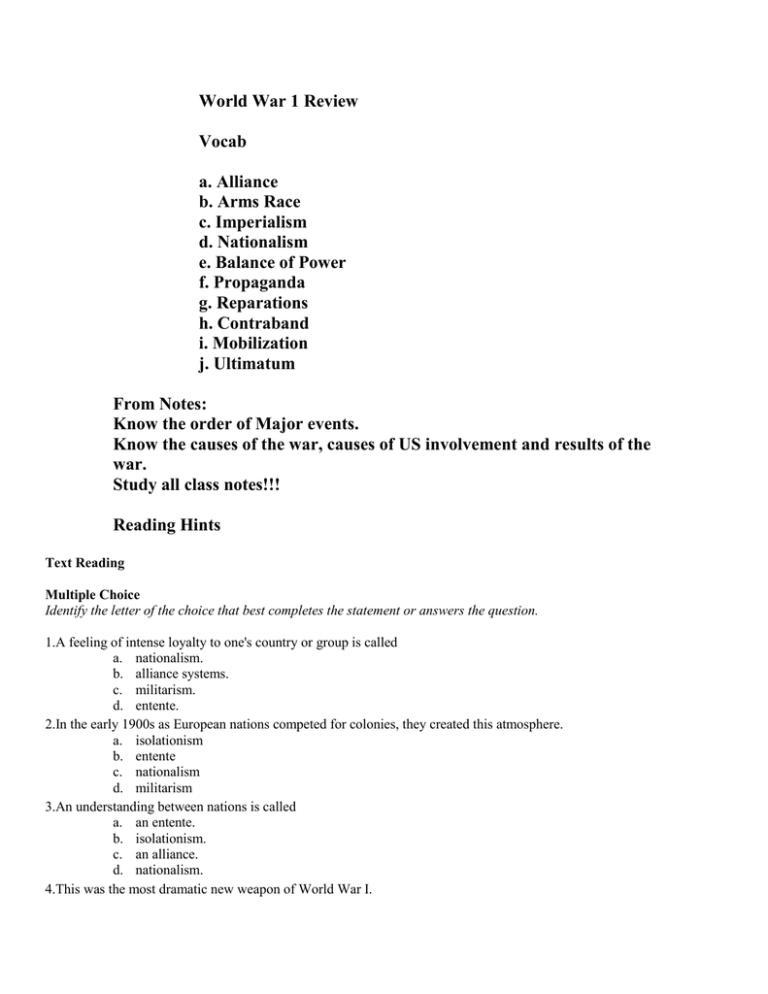
World War 1 Review Vocab a. Alliance b. Arms Race c. Imperialism d. Nationalism e. Balance of Power f. Propaganda g. Reparations h. Contraband i. Mobilization j. Ultimatum From Notes: Know the order of Major events. Know the causes of the war, causes of US involvement and results of the war. Study all class notes!!! Reading Hints Text Reading Multiple Choice Identify the letter of the choice that best completes the statement or answers the question. 1.A feeling of intense loyalty to one's country or group is called a. nationalism. b. alliance systems. c. militarism. d. entente. 2.In the early 1900s as European nations competed for colonies, they created this atmosphere. a. isolationism b. entente c. nationalism d. militarism 3.An understanding between nations is called a. an entente. b. isolationism. c. an alliance. d. nationalism. 4.This was the most dramatic new weapon of World War I. a. trenches b. U-boats c. airplanes d. automobiles 5.This German weapon affected the United States and changed the course of the war. a. trenches b. U-boats c. airplanes d. automobiles 6.Not one American soldier bound for Europe was lost to submarine attacks because of a. alliances. b. airplanes. c. convoys. d. entente. 7.After declaring war on Germany, Americans immediately began a. sabotaging the Germans. b. dissenting. c. antiwar propaganda. d. mobilization. 8.People who believe industries should be publicly owned are called a. committee members. b. socialists. c. dissenters. d. pacifists. 9.People opposed to the use of violence are called a. committee members. b. socialists. c. dissenters. d. pacifists. 10.Of the Fourteen Points, the one Woodrow Wilson considered the most important concerned the a. call for free trade. b. freedom of the seas. c. League of Nations. d. national self-determination. 11.People who share a common language and traditions are part of the same a. nationalism. b. alliance system. c. ethnic group. d. entente. 12.Defense agreements among nations are called a. nationalism. b. an entente. c. an alliance system. d. ethnic groups. 13.Germany's invasion of this country caused Great Britain to enter the war. a. France b. Belgium c. Austria d. Italy 14.This body joined the Central Powers because it had fought Russia in the past and feared new aggression. a. United States b. Ottoman Empire c. Italy d. Netherlands 15.This country joined the Allies because it was a rival of Germany. a. China b. Mexico c. United States d. Japan 16.With this, Russia surrendered Poland. a. Treaty of Brest-Litovsk b. Treaty of the Marne c. Treaty of Paris d. Treaty of Versailles 17.To ensure production of vital war materials and resolve labor disputes, the government created the a. National Labor Union. b. American Alliance. c. United States War Act. d. National War Labor Board. 18.World War I cost the United States about a. $1 million. b. $32 billion. c. $50 billion. d. $50 million. 19.The Treaty of Versailles carved up the Austro-Hungarian Empire and this empire. a. British Empire b. Russian Empire c. American Empire d. Italian Empire 20.This country, which fought in the war, did not sign the Treaty of Versailles. a. United States b. France c. Great Britain d. Germany
